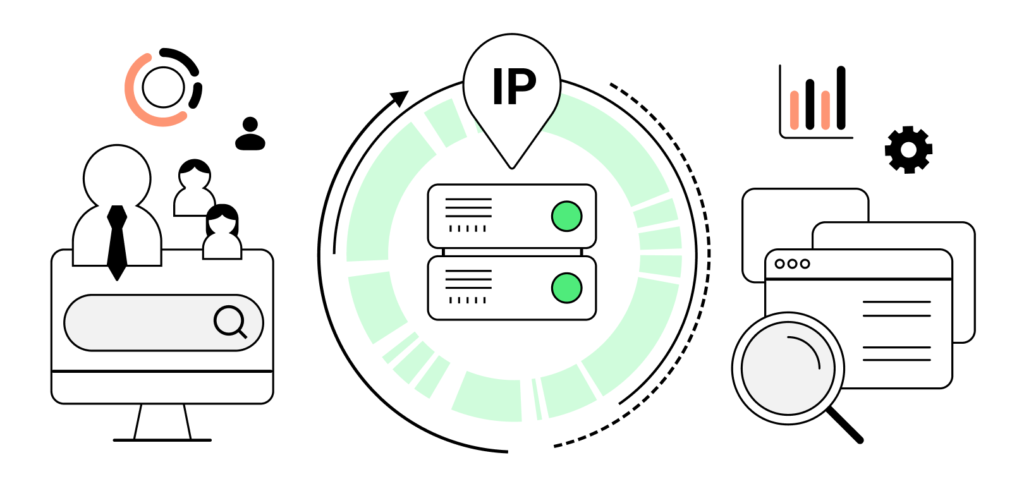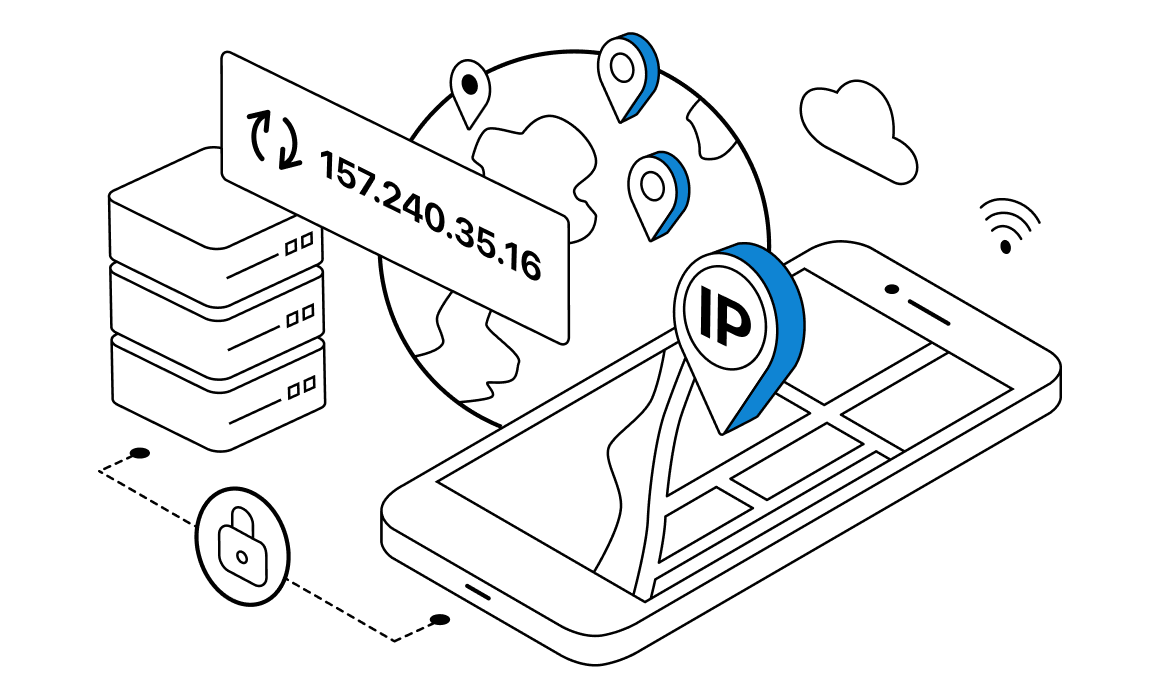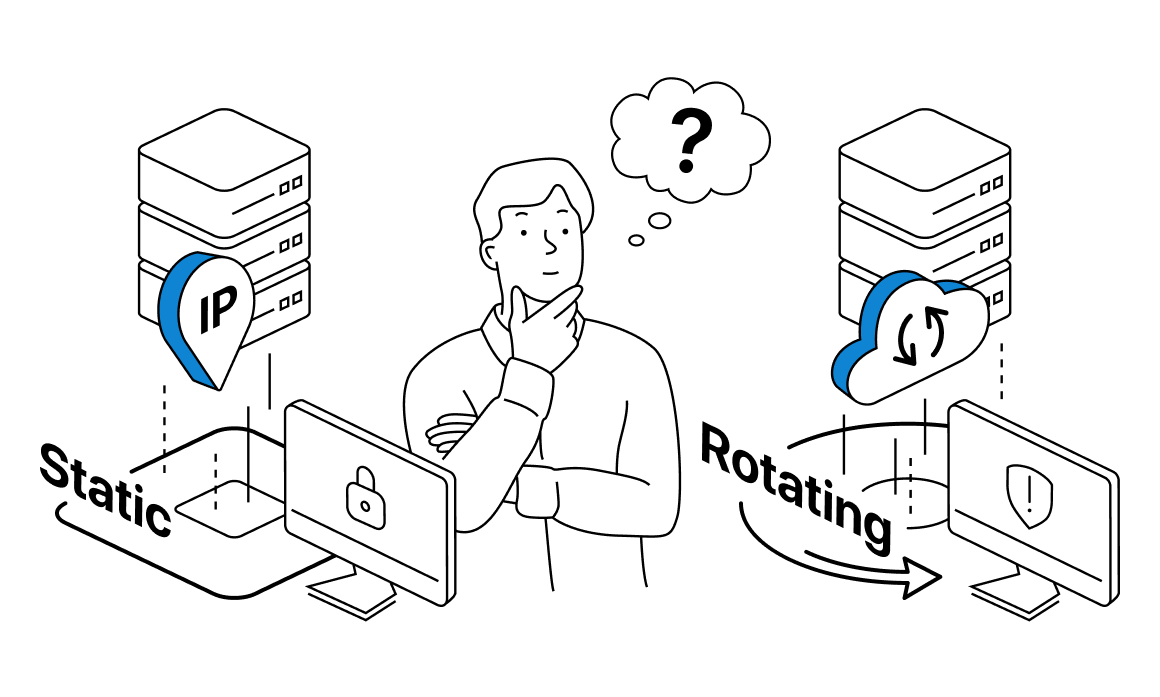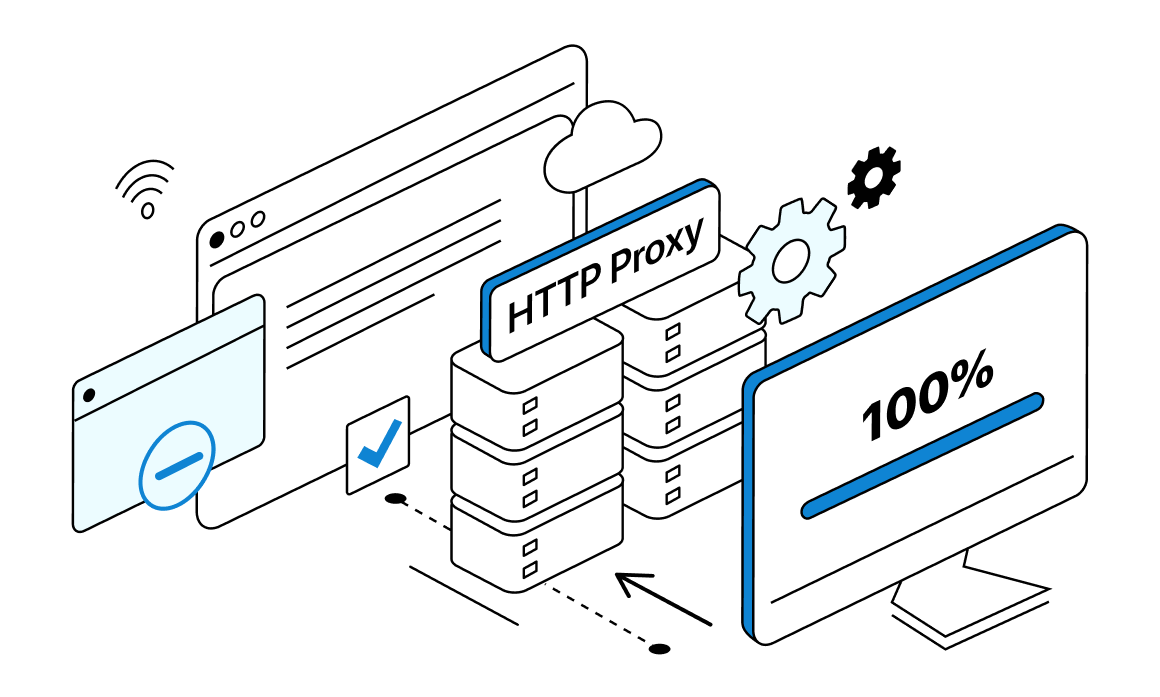Whenever you come across the subject of using proxies for online missions involving web scraping, the concept of IP address rotation comes into play.
But, please, do not get alarmed when you hear about scraping. It is not only a practice some black hackers would use to collect data. It is also a very handy tool for gathering information on your current market standings for making strategic decisions on your business growth.
In this article we will start by talking about how to rotate proxies and IP addresses from the perspective of your online activities.
We will cover the benefits and risks of such operations and give you some insights on more efficient ways to rotate IP addresses.
You will also learn about types of IP rotating methods and some of the most common mistakes people make while trying to employ such techniques.
But first things first, so, let’s define what the IP address rotation process actually means.
So What is IP Address Rotation?
IP rotation is a process of assigning new IPs to a device upon each new outbound request or at a set time interval.
What it means for you, is that a proxy that has a built-in rotation mechanism (often referred to as a rotating or backconnect proxy) changes your IP every time you try to access the target website.
But why rotating your IP can be important and what upsides can you expect from this process?
Benefits of Using Rotating IP Addresses

One of the major benefits of rotating IP addresses is adding anonymity to your connection during web scraping and parsing missions.
As you might know, websites (search engines, e-commerce platforms, marketplaces, etc.) are fitted with anti-spam and anti-scraping systems that are meant to prevent access from a single IP for in-depth data collection. With an IP rotation proxy you can stay below the radar by mimicking your actions as multiple web requests from various legitimate online users.
And the cases where you can use such techniques are countless. Some of the common operations include:
SEO intelligence. Using unlimited rotating proxies (rotating proxies with unlimited bandwidth) for SEO purposes has become a trend for checking your standings and keyword rankings in various locales. You can be very geo-specific here by using EU, American or other proxies for various regions of optimization.
Market intelligence. Rotating your IPs will ensure continuous scraping of platforms such as yellow pages and online business catalogs to collect and analyze information on your competition and products related to your markets. You can scrape websites for commercial information such as prices and special deals depending on particular market conditions. For instance, you can create a script that will help you collect special offerings during holiday seasons to enable momentary promotional activities in certain geographical areas.
Lead Generation. Applying the same IP rotation techniques for social media will help you gain an edge over your competitors in locating prospect clients in the areas that interest you most strategically. When you apply IP rotation for sites like LinkedIn, you will be able to parse data sets on people and decision-makers matching certain criteria. This can be helpful for sales team outreach or for talent search.
Sneakers copping. When you hunt for a rare pair of sneakers during short drops, it makes sense to use proxies for sneaker bots with rotating mechanisms to give you an edge. Here, you can order very specific branded proxies (e.g. Nike or Adidas proxies) that will help you do the job on some select sites and in required geo locations. With proxies for sneakers we highly recommend you to consult with our account managers on your particular use case, since some of the vendors can be super sensitive to the types of proxies used for buying sneakers on their sites. Please follow this advice to avoid red flags on footwear sites.
How to Rotate IP Addresses
There are a number of ways how the IPs are rotated on the providers’ side. The most common methods for rotating an IP address are the following:
Random rotation. This method assumes that each new request that you make to your target website will be forwarded from a new IP. A proxy provider assigns a new IP address automatically and with random intervals; the user does not have a direct control over the process.
Specific rotation. Unlike with random IP rotation, here the user can define which IP will be used with every connection. The proxy settings in this case are controlled from the provider’s dashboard and may vary from one provider to another.
Interval rotation. This type of rotation presumes that IP rotations occur after certain time intervals. Here a new IP is assigned once the time of one session elapses. Normally, this setting can be adjusted by an administrator for each rotating proxy from the dashboard of your proxy provider.
Why is IP Rotation Essential?
Well, IP rotation implemented with the use of proxies helps prevent the detection and blocking of your proxy’s IP address.
When a proxy server uses the same IP address repeatedly, it can be easily identified and blocked by the target websites or online services equipped with anti-bot or other types of access control systems.
Through IP rotation you utilize multiple IP addresses, which makes it more difficult for websites to detect and block your presence. If implemented properly and with a reliable rotating mechanism, you will ensure a long lifetime of your proxy servers.
How to Ensure Proper IP Rotation
One of the obvious methods of IP rotation with several proxy IPs would be through manual replacement of one set of settings with another inside your browser. However, this can become a tedious job if you need to perform this procedure several times over.
If you happen to have some knowledge of coding in Python, for instance, you can proceed with writing a script that will ensure IP rotations. Here, you have to be careful with having your script properly tested to avoid any technical problems.
Some proxy providers offer special proxy rotators that you can use with regular static proxies to configure rotations. Once you buy a set of proxies you can feed them into the rotator and the final setup will be very close to a regular rotating proxy.
But, of course, the most common scenario would be acquiring a set of rotating proxies where the server automatically changes its IP address. Such proxies can be configurable, with time intervals between IP swapping in milliseconds. And, you will be able to set random rotations as well, when a new IP will be assigned to each new connection.
Common Mistakes With Proxies and IP Rotation
The most common problems that may occur during IP rotations are caused by insufficiently tested custom-written scripts for automatic rotations of static proxies. The obvious way to avoid this problem is to buy a set of, say, pre-configured cheap rotating proxies from a trusted provider. An alternative solution would be to get a professional coder to test your script to ensure its efficiency.
Another common mistake lies in overusing particular proxies. To avoid such a problem, you need to make sure that you use several sets of IPs for certain websites with sophisticated anti-bot systems that can detect and ban whole sets of IPs based on suspicious behavior.
Is IP Rotation Legal?
Yet another concern that we often hear from proxy users refers to the overall legitimacy of rotating IPs for data collection. Here, the answer is very straightforward: your actions cannot be qualified as illegal unless you are violating the law. And scraping data from publicly available resources can be seen inappropriate only from the perspective of the owners of such resources and local regulations thereof. Hence, the presence of anti-bot and other protection systems. So, unless you are breaking the law, you have nothing to worry about.
Things to Remember While Rotating IP Addresses
When you engage in IP rotation of your proxy IPs, please keep in mind the following principles for ensuring successful online operation.
1. Keep track of the IP addresses you are using and when you last used them.
2. Make sure that the IP addresses you are rotating are not blacklisted or flagged by any websites or services you are accessing.
3. Use a randomized rotation schedule and “sticky” sessions of IPs (when a proxy IP is used extensively until rotated) to avoid patterns that may be detected by websites or services.
4. Avoid using free proxy services as they may be unreliable and could compromise your security.
5. And, finally, be aware of any legal or ethical considerations related to rotating IP addresses, such as terms of use of the target websites and/or laws related to online privacy and security.
IP Address Rotation with PrivateProxy
From the article above you could have properly guessed that IP rotation is super essential for some heavy duty online missions involving data scraping and parsing. And you are completely correct. We at PrivateProxy know exactly when our clients would benefit the most from having high quality residential proxies with unlimited bandwidth or datacenter backconnect IPs.
For you, all it would take is to give us some specifics on the way you want to use proxies and we will gladly supply you with the right IPs fitted with state-of-the-art rotating mechanisms. Your missions may include parsing data from search engines or marketplaces to get an edge in your competitive business environment, or getting a good look at how your ads are performing. Rotating proxies may also be quite handy in securing the latest sneakers at drops throughout the globe or to be used as gaming proxies on some remote servers.
In each of the cases you will be on top of the game with the most reliable rotating proxies from one of the trusted names in the industry.
Frequently Asked Questions
Please read our Documentation if you have questions that are not listed below.
-
How to rotate an IP address?
If your online project requires changing your IP on a regular basis (after a certain interval or on each new connection), you can do it several ways: 1) manually, by changing proxy settings in your browser; 2) by using a special app or a proxy rotator, which helps rotating IPs of regular static proxies; 3) by using special rotating proxies with settings available via your dashboard.
-
Is IP rotation legal?
Absolutely. Using rotating proxies for rotating your IPs is legal unless and until you use these digital tools for breaking the law. Yes, some websites feature special anti-bot and anti-spam protection systems meant to prevent scraping and parsing, and, yes, it can prevent unimpeded use of proxies, but it does not mean that you are breaking any local laws. However, if you have any concerns over the legality of proxy use in your particular case, please seek professional legal advice.
-
How do I get a rotating proxy?
A rotating proxy is a specially configured server that can be acquired from a proxy provider with hi-tech proxy solutions. Privateproxy has over a decade of experience providing rotating proxies to its clients for various use cases, ranging from data scraping for business and market development to lead generation.
-
How do I rotate an IP in Python?
This can be performed in a number of ways: 1. You can do it using the ‘requests’ library. This way you will need to specify a new proxy for each rotation. 2. Using a stem library in Tor. This way you will be able to send a NEWNYM signal to Tor to get a new IP address. 3. Using the scraping library, where you can create a class for random proxy selection and finetune the proxying behavior to your needs.
Top 5 posts









While choosing the right proxy type for your missions, you will inevitably come across the issue of selecting proxies by their origin and the mode of operation. You can have static proxies with constant IPs or rotating proxies with different IPs assigned to them from a pool on each session or after a certain time interval.